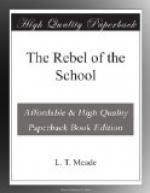But as she ran through the autumn night-air she felt that, after all, there was something good in life. Her pulses, which had been languid enough in the stuffy little parlor at the back of the shop, now galloped fiercely. She arrived two or three minutes after nine, but still in fairly good time to see a number of dark heads surrounding a bright light. This light was caused by two lamps which had been placed on the ground in the old quarry; Kathleen had brought them herself in a hamper. She had managed to buy them that day, and had smuggled them off without any one being the wiser. A large bottle of crystalline oil accompanied the lamps. Kathleen, who had dressed lamps for pleasure at home, knew quite well how to manage them, and when Susy appeared they stood at each end of a wide patch of light. Kathleen herself was in the midst of the light, and the other girls clustered round the edge.
“Isn’t it scrumptious?” said Kate Rourke.—“Oh, is that you, Susy Hopkins? You are late.”
“Yes, I know I am. It’s a wonder I could come at all,” said Susy.
“Ruth Craven hasn’t come yet,” said another voice.
“Yes, here she is,” cried a third, and Ruth came and stood at the edge of the patch of light.
Kathleen flung off her hat, and the light from the lamps lit up her brilliant hair. Her cheeks were flaming with color, and her very dark-blue eyes looked as black as night. She faced her companions.
“Well,” she said, “here we are, and we call ourselves the Wild Irish Girls. I really wonder if you English girls who are assembled here in the old quarry to-night have the least idea what it means to be a wild Irish girl. If you don’t know, I’d like to tell you.”
“Yes, do tell us,” cried several.
“The principal thing that it means,” continued Kathleen, raising her voice to a slightly theatrical pitch, and extending her arm so that the lamplight fell all over it—“the chief thing that it means is to be free—yes, free as the air, free as the mountain streams, free as the dear, darling, glorious, everlasting mountains themselves. Oh, to know freedom and then to be torn away from it! Girls, I will tell you the truth. I feel in your dull old England as though I were in prison. Yes, that’s about it. I don’t like England. I want you girls to join me in loving Ireland.”
“But we can’t hate England,” said Kate Rourke; “that is quite impossible. If Ireland is your native land, England is ours, and we cannot help loving her very, very much.”
“You have never known Ireland,” continued Kathleen. “You are not cramped up in that favored spot; you are allowed to get up when you like and to go to bed when you like, to eat what you like, to read what books you like, to row on the lake, to shoot in the bogs, to gallop on your pony over the moors, and—and—oh, to live the life of the free.”
It was Ruth Craven who now interrupted the eager words of the queen of the new society.




